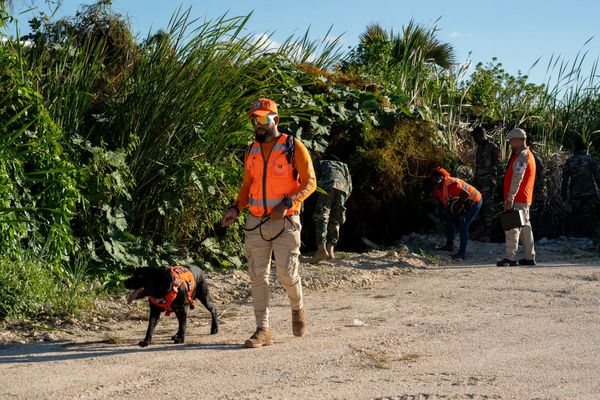
Public health officials are facing calls to improve whooping cough vaccine rates in England’s most deprived areas, with experts fearing the housing and cost of living crises may be contributing to low uptake.
Rates of people having taken the six-in-one vaccine, which protects against whooping cough among other diseases, is at the lowest level in the 10% most deprived local authorities in England, according to a Guardian analysis of UK Health Security Agency data.
This week it was revealed the UK may be experiencing its biggest outbreak of whooping cough in two decades, with five deaths reported among infants who developed the disease in England between January and March.
The Guardian’s analysis shows that 87% of the children living in the most deprived local areas of England had been fully vaccinated at the age of one, as of December 2023. This compares with 94% of those living in the wealthiest parts of England.
London had the lowest rate of vaccination, with 86.2% of children having taken the three doses of the vaccine at 12 months compared with 95.6% in the north-east. But even when London was excluded, the most deprived areas in England still had the worst coverage.
The cost of living crisis, precarious and poor housing, and the current socioeconomic climate have all been cited by experts as reasons for poor vaccine uptake in the most deprived communities across England.
Dr Ben Kasstan-Dabush, an assistant professor in global health and development at the London School of Hygiene & Tropical Medicine, said the deaths of the five infants from whooping cough reflected “the strain and limitations that the immunisation and public health systems are working under”.
The lower levels of vaccine uptake in deprived areas should not be dismissed as simply due to “vaccine hesitancy”, but rather due a wide range of factors, according to Kasstan-Dabush.
“If we look at urban settings like London, the populations are much more mobile, and diverse and living in extremes of inequality. We live in a context of an awful cost of living crisis which is putting parents under immense strain, and this is going to affect what they’re able to do with their priorities,” Kasstan-Dabush said.
“Those in very financially precarious situations, their ability to get to the vaccination points might look different.”
He added that in a mobile population, people could “fall through the cracks of the system, which can affect the vaccination services offered”.
Having vaccination centres embedded in community centres, such as Sure Start children’s centres, could be part of the solution to improving vaccine uptake in harder to reach communities, according to Kasstan-Dabush. “I think the need for flexibility and creativity in immunisation services is most needed in these areas,” he added.
Prof Andrew Preston from the University of Bath’s Milner Centre for Evolution, said the need for vaccines to be primarily administered by GPs might contribute to lower uptake in deprived communities, and that widening access to vaccination could help.
“Looking at all the issues over access to GP appointments, it’s clear that those socioeconomically deprived areas, those that are most stretched for access to GP services, and of course our vaccinations tend to be given through healthcare centres predominantly,” Preston said.
“We learned the lessons during the pandemic. We saw that we had improved vaccine uptake if we made it really, really easy for people to access the vaccine, so not just having to get an appointment with a healthcare professional.
“So whether we could think about doing it through pharmacists seems to be the solution at the moment, given how stretched GP surgeries and healthcare workers are.”
He added that people living in precarious housing and frequently having to move was also a factor in low uptake levels among more deprived communities.
“I think we’ve seen with the housing crisis that there are people moving around a lot more. And of course, if you’re not registering with your local GP or you’re struggling to do it, particularly with infant vaccinations … [people] could slip through the cracks.”
Among the local areas with the lowest rates, 13 of the top 20 are in London. Other areas outside London with the lowest coverage are Rochdale, Salford, Liverpool, Knowsley and Blackburn with Darwen in the north-west and Birmingham.
In terms of the UK, England has the lowest coverage of the vaccine protecting against whooping cough, with 91.3% of children having completed immunisation at 12 months compared with 94.8% in Scotland, 94.5% in Wales and 92% in Northern Ireland.
Babies are given the six-in-one vaccine – which includes protection against whooping cough and other five diseases – at eight, 12 and 16 weeks. The four-in-one preschool booster vaccine, which is given at children at the age of three, also includes protection against whooping cough.
The NHS also recommends that pregnant women are vaccinated against whooping cough to help protect their babies.
A Department of Health and Social Care spokesperson said: “Our sympathies are with the families of the children in these tragic cases.
“We are committed to improving vaccination uptake rates to fully protect the public from preventable diseases and are urging people to make sure they and their children have received all appropriate jabs. The vaccine is proven to be safe and effective.
“The UK Health Security Agency and NHS England have also been engaging local communities to highlight the importance of vaccination and make sure people know how to access the jabs as quickly as possible.”







